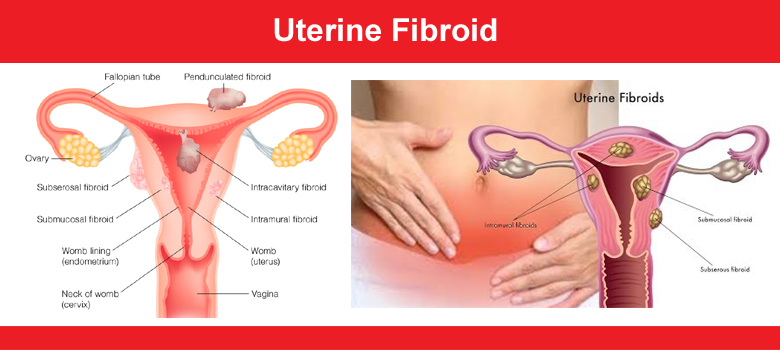What are uterine fibroids?
Fibroids are abnormal growths that develop in or on a woman’s uterus. Sometimes, these tumors become quite large and cause severe abdominal pain and heavy periods. In other cases, they cause no signs or symptoms at all. They may be of different types depending on the position like subserosal, intra mural or sub mucosal, pedenculated or non pedunculated. Out of this sub mucosal may cause heavy menstrual bleeding and trouble conceiving.
Causes of fibroids:
Exact causes are unknown but there are some factors that influence the formation of fibroids.
- Hormones: Estrogen and progesterone are the hormones produced by the ovaries. They cause the uterine lining to regenerate during each menstrual cycle and may stimulate the growth of fibroids.
- Family History: Fibroids may run in the family. If your mother, sister, or grandmother has a history of fibroids, you may develop it as well.
- Pregnancy: Pregnancy increases the production of estrogen and progesterone in your body. Fibroids may develop and grow rapidly while you are pregnant.
- Women are at greater risk for developing fibroids if they are obese or having family history.
What Are the Symptoms of Fibroids?
Symptoms depend on the location and size of the tumor(s) and how many tumors you have. If your tumor is very small, or if you are going through menopause, you may not have any symptoms. Fibroids may shrink during and after menopause.
Symptoms of fibroids may include:
- Heavy bleeding between or during periods that includes blood clots
- Pain in the pelvis and/or lower back
- Increased menstrual cramping
- Increased urination
- Pain during intercourse
- Menstruation that lasts longer than usual
- Pressure or fullness in lower abdomen
- Swelling or enlargement of the abdomen.
Medical Treatment
In most cases, treatment is not necessary, particularly if the woman has no symptoms, has small tumors, or has gone through menopause. Abnormal vaginal bleeding caused by fibroids may require surgical scraping of the uterine cavity in a procedure known as a dilation and curettage (D&C). If no malignancy (cancer) is found, this bleeding often can be controlled by hormonal medications.
There are so many ayurvedic and homeopathic medications that regulates hormone level to shrink fibroids.
Sometimes it is advisable by a doctor to stop taking birth control pills or hormone replacement therapy to prevent fibroid growth.
In some severe cases hysterectomy is advised by a doctor. Milder cases may be treated by laser therapy.
How to Prevent Uterine Fibroids
1. Protecting Yourself Against Fibroids:
Studies have shown that women who exercise regularly are less likely to develop fibroids. Studies also suggest that the more physically active you are, the more that exercise will help you prevent fibroids. Vigorous exercise for 3 or more hours per week may reduce your risk of developing fibroids by 30-40%
2. Manage your weight:
Research indicates that fibroids are more likely to occur in overweight or obese women. This may be because of the higher levels of estrogen in obese women. Very obese women are 2-3 times more likely to develop fibroids than women within a normal BMI range.
3. Green Tea:
Drink green tea or use green tea extract may help prevent the development of fibroids .Green tea has numerous other health benefits, Green tea has been shown to reduce the severity of fibroid symptoms for women who already have fibroids. If you are sensitive to caffeine, avoid over-consuming green tea. It is higher in caffeine than some other teas and can cause nausea, jitteriness, or irritability in some people.
4. Consider changing your diet:
Green vegetables are excellent sources of vitamins, minerals, fiber, and antioxidants. Vitamin D may reduce your risk of developing fibroids by over 30%. Vitamin D can also shrink the size of existing fibroids.
Recommended Read: Treatment for Uterine Fibroid at Astha Clinic, Ajmer
5. Medicines:
Early and mild or moderate cases of Uterine fibroid often respond to homeopathy and herbal medicines. Large and multiple fibroids may take very long time.
All fibroids have a network of blood vessels which keep the fibroid live as well as help it grow in size. We assume that the medicines we prescribe help by:
(a). Reducing or cutting the blood flow to the tumor. This is evident by the reduced bleeding or hemorrhage experienced by women on starting homeopathic medicines at our clinics.
(b). Blocking the blood flow causes death of the entire or part of the fibroid
(c). The fibroid usually shrinks in size over a few months. You may also experience pieces of the amputated fibroid being expelled out usually during your menstrual cycle.
The Author

Dr Ranu Gupta is an Ayurvedic physician and has done a significant research in curing patients suffering from white spots disease (Leucoderma), Psoriasis, hair problems, obesity, kidney stone, gall bladder stone and female ailments with utmost dedication and commitment to serve since 1998. Read More about Dr. Ranu Gupta.


